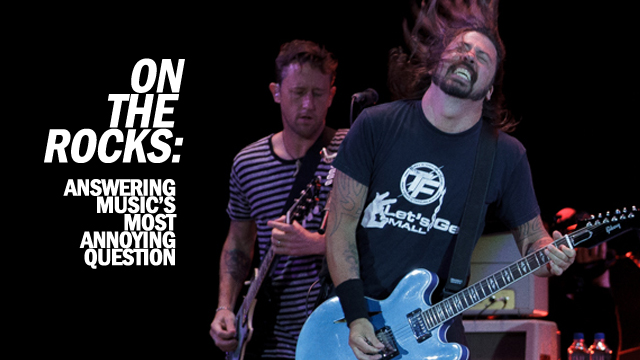
Photo Credit: Andrew Wade
No one ever asks if Hip-Hop is dead, if Pop is dead. Rarely, if ever, does any one bother to pit Country and Rap music against each other. Yet for the last 60+ years, as each decade comes to a close, there has always seemingly been an advocate for the death of Rock and Roll. Is Rock dead? How about now? And now? Yet each generation has replied in succession that Rock and Roll is here to stay. So that forces us to pose the inevitable question: why are we still talking about the supposed death of Rock and Roll?
The statement, upon first glance, might appear to have some merit. Within the last six months alone, Rock has suffered some heavy hits: Kanye West dissed Beck’s win at the Grammy’s claiming that Beyonce, a hip-hop/pop artist, deserved his award. Most recently, Tom DeLonge left Blink-182. Even Gene Simmons, a veteran in the world of Rock, has gone on record claiming that Rock and Roll is finally dead. Some might think it would be difficult to recover from such large blows, but if Motley Crue has taught us anything, it’s that Rock and Roll is nothing if not an expert receiver of blows.
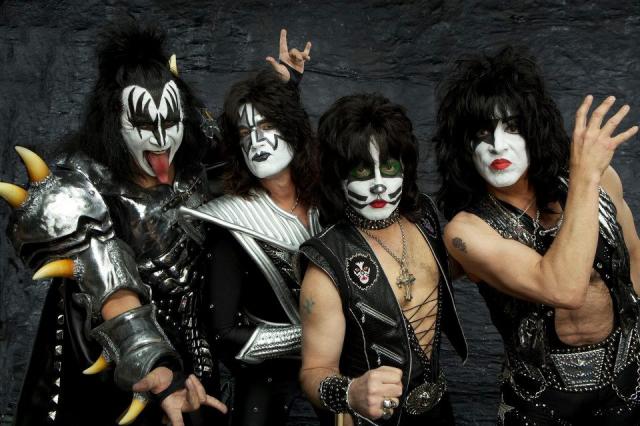
It’s Only Rock and Roll (But I Like It)
Emerging as a stand-alone genre in the 50’s, Rock was brought to the mainstream most notably by Elvis. Up until that point, Blues and what would become Rock and Roll music were all but stolen from black musicians and performed by white artists for a white audience. This was Elvis’s main allure: a man who could sing like a black artist but still appeal to a discriminative popular audience. Whether right or wrong, this arguably accomplished one thing: Rock music was now at the forefront of popular music.
From there, Rock music’s progression during the 60s was monumental. From The Beatles’ bigger-than-Jesus British Invasion to the creation of the black-hatted Rolling Stones, this decade of music served to uproot oppressive institutes, push experimental boundaries, and set a precedent for generations of rockers to come.
Pushing on into the 70’s we saw the emergence of pure Rock and Roll: no more pop covers, just guitar licks and gender defying vocals. Emerged were the incomparable likes of Black Sabbath, Aerosmith, AC/DC and cock-rockers, Led Zeppelin, KISS, and Van Halen, who set a model for the flamboyant next generation of guitar-flailing, makeup-wearing rockers to follow.
The 80’s Rock stars were all about excess: each one exclaiming through glossed lips an indubitable, “Fuck you” to government oppression, censorship, and the generation of prudes who parented them, much in the fashion of Jagger’s dissatisfaction throughout the 60s. Fronted by Def Leppard, Motley Crue, Bon Jovi, and Whitesnake, this was a time in which it appeared all you needed was high hair, low morals and a decent Rock ballad and brief Rock stardom would yours. But with success and excess came distress. Enter: the grunge era.
Seemingly overnight, the musical mood shifted drastically, and teens the world over were dressing down and giving up hair metal. Suddenly kids didn’t want to ignore their problems, they wanted to express them, to dwell on them, and bands like Nirvana, Silverchair, Radiohead, Oasis and Alice in Chains became their outlets.
The 90’s continued into the first decade of the 2000’s, which saw Rock continue as a musical front runner, with bands like The Strokes, Blink 182, The Darkness, Coldplay and My Chemical Romance, regenerating its reign in multiple sub-genre forms, leading us finally to present day.
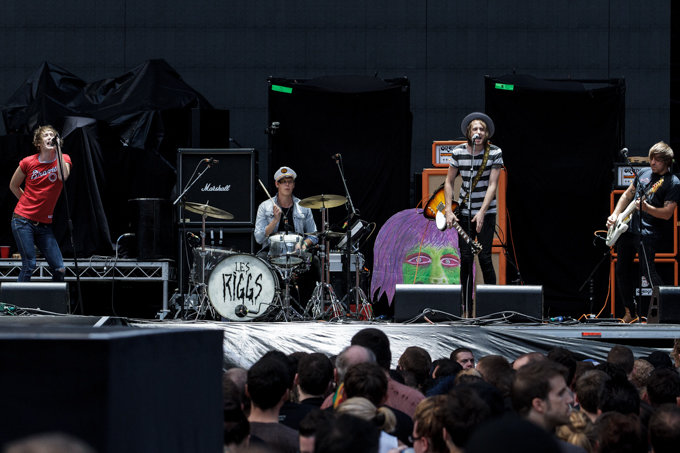
Generation Landslide
If nothing else, what’s clear from this brief history lesson is that Rock is a resilient creature, a sentiment which is echoed by Elliott Hammond, front man of Australian Rock Band, The Delta Riggs (pictured above): “Rock and Roll isn’t dead” he stated, “it’s just reinventing itself in different forms.” Some might have difficulty recognizing Rock and Roll’s dynamic hold as a genre because it is constantly diversifying. Rather than bow to the pressure of rap, hip-hop, boy bands and disco, Rock has mutated and morphed itself into subgenres and forms that can please and gratify the needs of each generation to come. Elvis turned to Zeppelin turned to Motley Crue turned to Nirvana.
In this way, Rock music has had the uncanny ability to link generations together. And for those who doubt its influence and pulsating presence in a music industry awash with Taylor Swift pop songs, music of all genres—Rock, Pop, and otherwise—continues to be undeniably influenced by Rock classics today. Charismatic singer, Max Kerman, of Canadian Rock band, Arkells (pictured below), aptly expressed this: “Most music that sounds fresh today is just a compilation of things from the past, re-arranged. Fun is very Queen sounding. Phoenix clearly loves Fleetwood Mac. Bruno Mars loves The Police.” In a trickle-down effect that has spanned over decades, Rock has become instrumental not just as its own genre, but as the arbitrator between genres and generations amass.
And still more impressive, are the specific Rock bands that have managed to transcend generations, not just in influence, but also in performance. These bands defied and continue to defy the limited precedent once set for Rock and Roll formations, when bands were once expected a shelf life of only one to two years. Who can enthrall generations like Mick Jagger? Who can demand the attention of the audience with such charisma as Steven Tyler? U2, Bon Jovi, Springsteen, and most notably, The Rolling Stones—who recently celebrated a staggering, unparalleled 50 years of touring—perform on top earning tours and continue to fill massive arenas that even some of the biggest pop stars of today cannot.
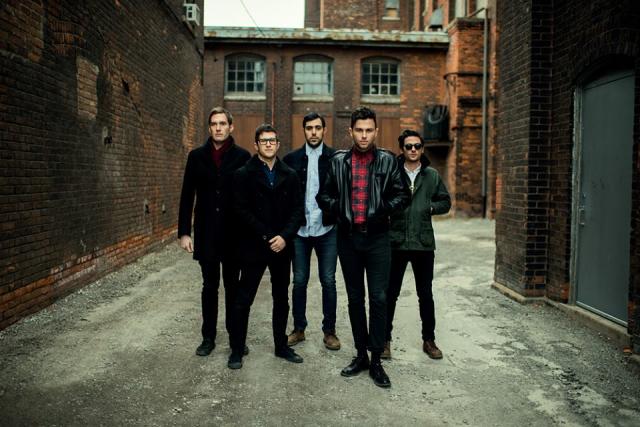
I’m Just A Singer (In A Rock And Roll Band)
Some readers might be thinking, that’s all well and great, Rock and Roll used to be relevant, we get it, but what is it doing now? Where is the next great Rock star? Where are our Mick Jaggers, Jim Morrisons, our sex symbols and Rock gods?
Rock stardom has long been portrayed as talent punctuated by a lifestyle of sex, drugs and infamy. With stars like Jimi Hendrix and Brian Jones dying prematurely, Ozzy Osborne snorting ants on tour, and a drug-addled Keith Richards defying the odds and probably out-living us all, Rock-fame and notoriety have become nearly mutually inclusive. Without these glaringly obvious campaigns of overspending, arrests, and substance abuse, it might be harder to spot our modern Morrisons today; but that doesn’t mean that they don’t exist.
While you’re hung up waiting for the next Michael Hutchence, bands like Foo Fighters, Mumford and Sons and Arkells are achieving number one records and selling out international tours. Arkells recently had to play three Toronto dates in one tour leg because the first two sold out so quickly. The only difference in this generation of Rock stars, it might seem, is that bands no longer identify as such: Hammond, who has just come off a massive tour with Foo Fighters, stated, “We aren’t Rock stars, or interested in glamour or notoriety.”
Compared to bands of the 60’s, 70’s and 80’s—with their crashed cars, acquired crabs and snorted income—today’s most promising acts seem a far cry from the debauchery we have come to associate with the stereotypical Rock star image. On the subject, Kerman, had this to say: “I think the days of Sex, Drugs, and Rock and Roll don’t exist like they used to. There’s not enough money. If you do over-indulge, then you’ll be a broke joke emailing your parents for money all the time…I think we just really appreciate the job we have, and don’t want to fuck it up.”
It would seem that some of today’s artists, with the decline in general music sales, have either chosen or been forced into a more modest, pragmatic spawn of Rock star. Hammond, who recently won the Rolling Stone award for Best Live Act, had surprisingly similar sentiments on the matter: on the pressure to live up to his front man forefathers, he shared, “We like drugs as much as the next person but any idiot can do drugs and it’s not something I’d say we promote like some of our peers do. It’s the lifestyle we lead and it is real. It’s not contrived or pre-empted.”
Despite a hesitation to follow deliberately in the footsteps of the Vince Neils and Mick Jaggers before them, these bands still possess that on-stage magnetism, that indescribable ability to enthrall a throng of thousands, just as those who pioneered Rock before them. Today, these musicians are allowing focus on—rather than their notoriety—their art, and doesn’t that seem like an affective way for artists to keep a genre alive?
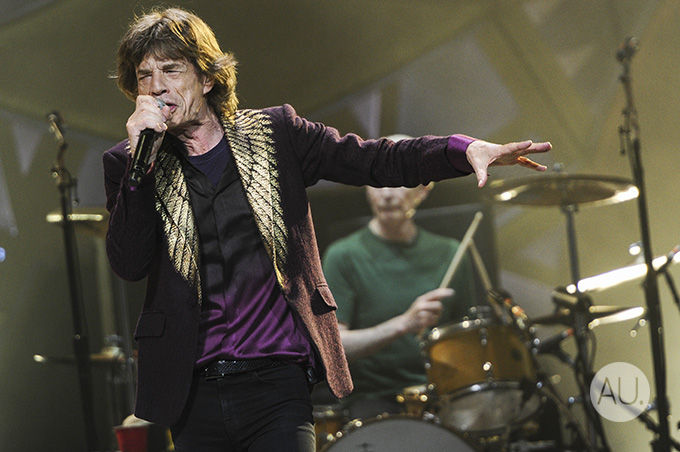
Photo Credit: Stuart Sevastos for the AU review
Is There Anybody Out There?
So now that we know that the genre itself is not the problem, and that quality musicians and front men are not lacking, what/who might be to blame for the alleged uncertainty of Rock and Roll? The problem lies not with the talent, it would seem, but the current nature of the music industry itself. In a generation where music is more easily illegally downloaded than paid for in ticket or album, bands are suffering. Right now, every time you turn on the radio, it’s hard not to get one non-controversial, commercially molded pop artist confused with the next.
These diluted artists are some of music’s top earners, shaped and marketed for the specific goal of mass sales. As a result, the quality of popular music is often lacking. For those bands that do lay their time, effort and talent at the feet of the industry, the lifestyle returned can be monetarily taxing: “Right now, touring is very expensive and financially (and emotionally) draining,” says Kerman. So, if you’re like Hammond, who would “like to see Record Labels stop shoving watered-down shit down people’s throats,” if you want quality Rock and Roll’s survival to never again be questioned, his advice is simple—and glaringly obvious: “Buy Records. Go to shows.” Brilliant. Kerman also elaborated on the subject:
“There is a real magic to seeing people perform instruments in a live setting. Seeing musicians interact with each other musically and with the crowd can be so moving. That feeling is really hard to recreate and beat… I think deep satisfaction of any art often comes with a level of attention and commitment from the viewer/listener…You should support Rock and Roll for the same reason you should support reading a book or going to an art gallery: it’s a worthy artistic pursuit. If we are interested in holding on to this, keep nurturing all the young talent by going to the shows, tweeting about it, buying their shitty EPs…Every great band/artist started as a terrible band/artist.”
In that regard, the opinion seems unanimous. If we want Rock and Roll to stick around and to put this “Rock is dead” argument to rest, we as fans have to comply by contributing to the cause.
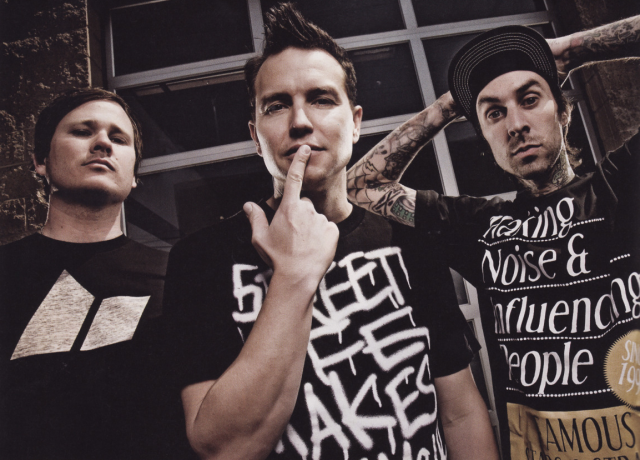
It’s Still Rock And Roll To Me:
When it comes to the supposed demise of Rock and Roll, it seems that those advocating for it are a little confused. Rock and Roll is here, and it never really left. It is only natural for its level of domination to have fluctuated over the period of half a century; yet Rock is still growing, influencing other genres, creating number one records, and selling out international tours. We still have our dynamic front men, from bands both classic and new, and we as an audience still crave that Rock and Roll sound. Simply put, Rock and Roll is alive and well, and maybe those who believe otherwise just aren’t looking in the right direction.
Sure, Kanye publicly dissed Beck’s Grammy winning Rock album, Blink 182’s lineup crumbled, and Gene Simmons said some mean words; I could end this article with sentimental Neil Young lyrics, but all of this might be more potently addressed in a single closing quote from Elliott Hammond:
“Just because Kanye West says he is the Next Mandela doesn’t mean it’s true… Rock and Roll isn’t dead; it’s just reinventing itself in different forms. The devil works in mysterious ways—c’mon, we all know that. Blink 182 aren’t Rock and Roll. They’re three rich guys that squabble over whose bus leaves the festival lot first… KISS suck balls and Gene Simmons represents the absolute worst qualities a human being can have.”
Amen, Elliott. Long live Rock and Roll.
———-
